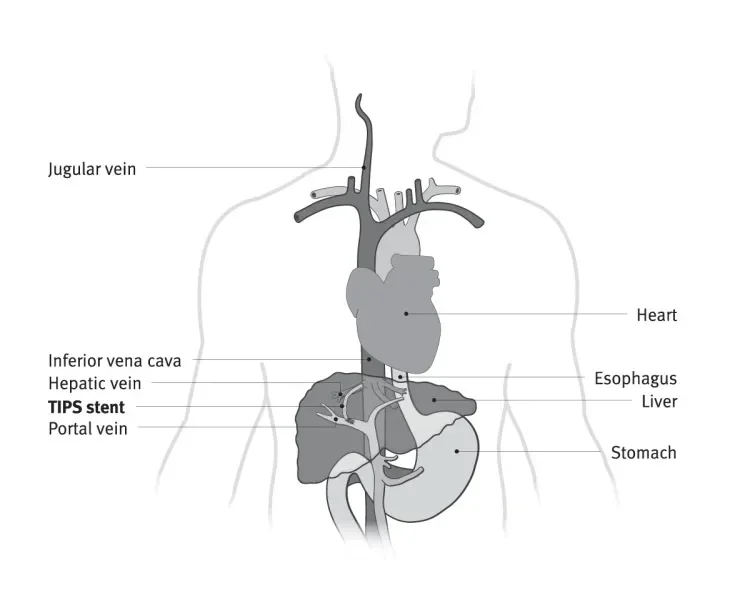
Consider TIPS in Treating Portal Hypertension
Patient Information > Symptoms
Diagnosing portal hypertension
Every patient is different, and every patient experience may be different. Generally, the doctor will perform a physical examination along with lab and blood tests. Sometimes, a diagnosis is based on symptoms, particularly if you are experiencing bleeding or fluid retention in your abdomen. An ultrasound may be used to see how blood is flowing in the portal vein and nearby vessels and also detect the extent of fluid in the abdomen. Other diagnostic tests that may be used include magnetic resonance imaging (MRI) or computed tomography (CT) to look for blood vessels. The doctor can help determine the cause of your portal hypertension, measure its severity, reduce any complications and improve survival.
Ascites and other symptoms
A complication of portal hypertension, called ascites, is a buildup of fluid in the abdominal area that can cause abdominal swelling, bloating, weight gain and shortness of breath. Ascites is the most common cause of hospitalization in patients with cirrhosis and indicates advanced liver disease.1
Ascites can lead to an infection called spontaneous bacterial peritonitis (SBP). SBP occurs when the excess fluid in the abdomen becomes acutely infected with bacteria for an unknown reason. This complication can be life threatening and is often treated with intravenous (IV) antibiotics. After recovery, your doctor may recommend continued treatment with antibiotics to prevent SBP from recurring.
Ascites related hernias can develop around the belly button and groin, causing discomfort. If the pain is severe, then surgical repair may be necessary.
Variceal bleeding
When portal hypertension reduces the blood flow through the liver, the body diverts blood away from the liver by increasing blood flow through vessels surrounding the stomach and esophagus. This increased blood flow and pressure changes these vessels into swollen, twisted and weak veins called varices.
Varices can rupture and cause variceal bleeding, a potentially life-threatening complication that requires immediate medical attention. Varices of the esophagus are frequently found in people diagnosed with portal hypertension. Over time, varices tend to enlarge, resulting in a higher risk of bleeding.
This information is intended for education and awareness only. Patients should consult their physician for information on the risks associated with the devices and surgical procedures discussed in this website. All surgical procedures carry potential health risks. Not all patients will be candidates for treatment with these devices, and individual outcomes may vary.
Always follow physician advice on your post-surgery care and recovery.
Refer to Instructions for Use at eifu.goremedical.com for a complete description of all applicable indications, warnings, precautions and contraindications for the markets where this product is available. RXOnly

Reference
- Fortune B, Cardenas A. Ascites, refractory ascites and hyponatremia in cirrhosis. Gastroenterology Reports 2017;5(2):104-112. https://www.ncbi.nlm.nih.gov/pmc/articles/PMC5421465/
